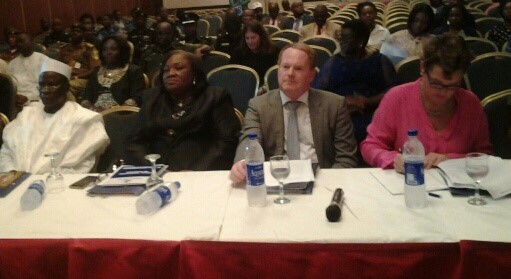Over four years – some 56 months – of implementation of a project tagged “Support to the Justice Sector in Nigeria” formally came to a close in Abuja on Thursday, August 17, 2017 amid pomp and circumstance.

Implemented by the European Union (EU), United Nations Office on Drugs and Crime (UNODC) and the Federal Government, the project gulped a whopping €19,076,309.
The project was realised in locations such as Abuja and nine focal states of Anambra, Bayelsa, Benue, Cross River, Imo, Katsina, Lagos, Osun and Yobe. Its main objective was to strengthen the Rule of Law through enhanced accountability, accessibility, transparency and fairness of the justice system in Nigeria.
Essentially, the Support to the Justice Sector in Nigeria Project aimed to complement the efforts of government in improving justice delivery through effective coordination and cooperation among justice sector institutions, with enhanced legal and policy frameworks, strengthened operational structures and capabilities of officials in the sector, and increased access to justice and respect for human rights and the rule of law, especially for disadvantaged and vulnerable groups including children.
Through the support of the projects, some 62 resource materials and publications were produced, including among others, Justice Sector Reform Action Plans for eight states, Court Users Guides (in several local languages), Revised Police Training Manuals, Police Human Rights Handbook and Training Manual, National Policy on Prosecution, Sentencing Guidelines and several publications on Child Justice.
UNODC Resident Representative in Nigeria, Ms Cristina Albertin, remarked that a unique feature of the projects is that it built a lasting platform for partnership among a wide range of federal and state actors in justice administration including network mechanisms with the aim to enlist holistic and comprehensive support across Nigeria justice institutions at federal and state levels for fair, accessible and faster delivery of justice for all.
She said: “In my view, this approach and resulting collaborative work cannot be anything less than a guarantee for continuity and sustainability in justice reform while the project formally ends. Let me assure you at this point that UNODC’s commitment to justice reform in Nigeria continues beyond project end as we know and recognise justice reform as a critical foundation to ensure the respect for human rights for each and every Nigerian, including the principle of equality before the law and the right to due process and fair trials.
The UNODC Nigeria boss congratulated and thanked partners and project supporters for making the initiative a success. She listed them to include the Federal Ministry of Justice, National Judicial Institute, Nigeria Law Reform Commission, Legal Aid Council of Nigeria, Federal Justice Sector Reform Coordinating Committee, Nigeria Police Force, Nigeria Prisons Services, National Human Rights Commission, Nigeria Institute of Advanced Legal Studies, Nigeria Bar Association, Ministry of Budget and National Planning, United Nations Children’s Fund (UNICEF), EU, GIZ, Embassy of Switzerland, as well as the nine states involved in the project’s implementation.
Albertin went on: “Good governance can only happen when it is grounded in accountable and fair justice systems. Public officials, be it legislators, governments or the judiciary will be judged by the citizens for their commitment to fair and effective justice delivery to each and every one.”
Referring to the resource materials and publications produced under the project, she stressed: “With these much-needed policy, legal and operational instruments and tools, justice practitioners are now equipped to deliver justice more effectively and efficiently, including to the vulnerable and poor without leaving anybody behind.”
Head of Development Cooperation, EU Delegation to Nigeria and ECOWAS, Kurt Cornelis, listed some of the project’s achievements to include: development and adoption of a National Justice Policy; passage of the Administration of Criminal Justice Act; establishment of judicial research centres in selected states.
“We believe that the project has effectively contributed to government’s efforts in reforming the justice sector, and it is our sincere hope that the gains currently achieved will be further enhanced,” he stated, even as he disclosed that a successor project, Support to Rule of law and Anti-corruption in Nigeria (RoLAC), has started.
Cornelis said: “The overall objective of the project is to enhance good governance in Nigeria by contributing to strengthening the rule of law and curbing corruption.
“The main expected outcomes are to: advance the timely, effective and transparent dispensation of criminal justice; strengthen access to justice for women, children and persons with disabilities at federal and state levels; strengthen the fight against corruption by reinforcing prevention mechanisms and building the capacity of anti-corruption agencies to effectively address corruption in public procurement, the criminal justice system and the extractive sector, and, to enhance civil society and public engagement in the fight against corruption and the criminal justice reform process.”
